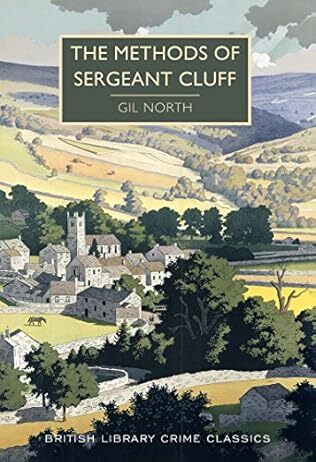The Methods Of Sergeant Cluff

A review of The Methods of Sergeant Cluff by Gil North – 241202
Originally published in 1961, the second in North’s Caleb Cluff series, and reissued as part of the British Library Crime Classics series, The Methods of Sergeant Cluff is the archetypal slow burner. For a relatively short book it takes its time to get going but it is well worth persevering with.
As the only detective in the town of Gunnershaw, even though he is on leave recovering from his exploits in Sergeant Cluff Stands Firm, Caleb is called upon to investigate the murder of Jane Trundle. It seems to be an open and shut affair, a case of get Carter, or at least according to Inspector Mole, but Cluff is not sure. Jane, an attractive girl who worked in the local chemist owned by Mr Greensleeve, was stepping out with Jack Carter, but those who knew her realized that he was unable to meet her aspirations for the good life. She had more money in her handbag than she would have accumulated from her earnings and, we later find out, she is with child.
Although the circumstantial evidence points towards Carter, he vehemently professes his innocence. Greensleeve, trapped in a loveless marriage, is a local worthy who prides himself on the position he has established for himself in the town. Jane was one of three female assistants in his employment and it emerges that more went on in the back room of the dispensary than making up prescriptions. The two other girls, Margaret and Jean, seem to know more than they let on and one of the subplots of the story is Jean’s moral dilemma as to whether to let on what she knows. Her decision almost leads to her demise.
The reader is lulled into a false sense of security as to where the story is heading, only for North to spring a twist in its tail, although there are enough pointers along the way not to make it a total surprise. Given the pace of the rest of the book the denouement is surprisingly dramatic and seems a little rushed with almost too much going on and little time to assess the developments. It does, however, make the wait worthwhile.
Cluff is far from a team player, a man of idiosyncratic methods, some of which would be frowned upon within the modern day police force. He uses his profound knowledge of the town in which he grew up and the characters that populate it to good effect and is prepared to literally stare out his suspects, increasing the psychological pressure until they crack. Although he is allocated an assistant, Constable Eric Barker, he is relegated to being a bag carrier, less use to the curmudgeonly detective than his faithful hound, Clive.
Cluff is also one who is willing to let events play out for themselves and in the end is content to play one suspect off against another, using a sprat to catch a mackerel. It is an approach that for all its moral dubiety brings results, but he does seem to believe that the justice system which he is supposed to represent is not always the most appropriate way to clear up a situation. To Moss’ exasperation Cluff’s methods do bring results.
North ratchets up the tension well and he has a profound sense of the tightness of the communities in which he has set his narrative. There is a discernible change in style, the sentences less staccato-like as he takes his time to explore the psychological impact of the case on the principal characters. I did not enjoy it as much as the first novel but, nonetheless, it made for a thought-provoking read.



